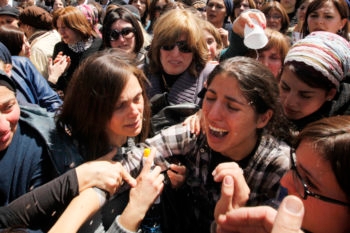
Gilad Shalit is greeted by cheering crowds as he finally returns to his family home in Mitzpe Hila, Israel after five years in captivity, Oct. 18, 2011. (IDF Spokesperson)

The sister of Toulouse shooting victim Miriam Monsonego cries at the funeral in Jerusalem, March 21, 2012. (Miriam Alster/Flash 90/JTA)
(JTA) – The Jewish year 5772 marked a period of growing uncertainty for the Jewish people.
From the threat of a nuclear Iran to Egypt’s newly cold stance toward Israel to the increasing chaos across the border in Syria, Israel found its longtime status quo imperiled on multiple fronts.
On top of that, a marked increase in attempts on Jewish targets overseas — from Israeli tourists in Bulgaria to Jewish schoolchildren in Toulouse, France — helped stoke Jewish insecurities. That sense was fueled by calls in a growing number of European countries to ban ritual circumcision and shechitah, Jewish ritual slaughter.
As might be natural for those faced with great uncertainties, the Jewish state seemed to retreat to conservative positions.
Negotiations with the Palestinians stayed at a standstill, with seemingly little motivation by Israel, the Palestinian Authority or the United States to get things going again. Israel’s left wing remained unable to muster a significant political opposition movement or a viable alternative to Israel’s conservative prime minister, Benjamin Netanyahu.
In the United States, Republican campaign strategists sought to take advantage of the anxious mood by raising questions about what a second-term Obama administration might mean for Israel. Their biggest help in that regard was casino magnate Sheldon Adelson, the Jewish philanthropist who vowed to spend up to $100 million to defeat President Obama. If there were a Jewish man of the year, Adelson — the money man reviled by critics and beloved by others for bankrolling Israel’s right-wing tabloid Israel Hayom, Jewish programming like Birthright Israel and Republican presidential candidates — unquestionably would get the title.
It’s still not clear how successful the Republican effort will be: Polls show Jewish support for Obama is down, but still higher than among Americans generally and higher than it was at this point in the campaign four years ago.
The Jewish year started out with a measure of relief for many in the pro-Israel community as the unilateral Palestinian bid for statehood recognition at the United Nations ended in more of a flop than a showdown. After rebukes at the U.N. General Assembly from Netanyahu and Obama a week before Rosh Hashanah, the Palestinian effort died in the U.N. Security Council, where a clear majority supporting statehood failed to emerge, obviating the need for a U.S. veto.
The only U.N. body in which the Palestinians made significant progress was at UNESCO, the United Nations Educational, Scientific and Cultural Organization, which voted in late October to accept the Palestinians as a member. That resulted in an automatic cutoff of U.S. funding, costing UNESCO some 22 percent of its annual budget.
For much of the year, however, the Palestinians were hardly Israel’s biggest concern. Intense will-they-or-won’t-they-attack speculation dominated the conversation about Iran, while U.S. and Israeli officials held a series of top-level meetings on how to deal with the Islamic Republic’s suspected nuclear weapons program.
The outcome was more saber rattling, tightening of U.S. and EU sanctions focused mostly on banking and oil, and a campaign of clandestine cyber warfare against Iran’s nuclear facilities. The efforts may have slowed Iran’s program, but they did not derail it. Iran continues to enrich uranium even as sanctions have handicapped the country’s economy.
On the strategic level, Israeli and U.S. officials did not resolve their differences on their respective Iran red lines. Israel held firm to the notion that Iran could not be allowed to acquire nuclear weapons capability, while the Obama administration said it would not allow Iran actually to weaponize. But the two allies seemed to reach an understanding whereby Israel would hold off on attacking Iran — possibly through the fall election — in exchange for a pledge to send more sophisticated U.S. weaponry to Jerusalem and more explicit rhetoric from Washington about the military option on Iran. As the summer heated up, so did the internal Israeli debate about the efficacy of attacking Iran, with a growing chorus of voices speaking out about the perils of a potential attack.
Iran hardly was the Israeli defense establishment’s only source of anxiety.
The newly bellicose tone from post-Mubarak Egypt was met with increasing concern north of the border. The year started with Israelis still shaken by the Egyptian mob attack and ransacking of the Israeli Embassy in Cairo last September, and by a deadly terrorist attack in Eilat the previous month that had originated in Egypt’s Sinai Desert.
In 5772, the Sinai continued to be a source of problems, including as a staging ground for attacks against Israel. The Egypt-Israel natural gas pipeline, a crucial source of energy for Israel that flows through the Sinai, repeatedly was sabotaged. Then, in April, the government in Cairo announced that it was halting all gas delivery to the Jewish state.
Meanwhile, Egyptian Islamists led by the Muslim Brotherhood, the parent organization of Hamas, triumphed in Egyptian parliamentary elections, and in June the country elected a new president from the Muslim Brotherhood, Mohamed Morsi.
While the 30-year-old peace between Israel and Egypt largely held — thanks in part to the Egyptian army’s forceful and undemocratic dominance of Egyptian politics — Israel began to adjust to a new reality in which the quiet along the Egypt-Israel border no longer could be taken for granted. Likewise, Syria’s devolution into civil war raised Israeli fears that the quiet along Israel’s border with Syria might end, too.
The biggest problem facing Israel along its southern border this year was not the intermittent shooting attacks from the Egyptian side but the continued flow into Israel of Africans — most of them economic migrants but some of them refugees — from countries including Eritrea, Sudan and South Sudan.
In late spring, riots broke out in Tel Aviv targeting the African migrants and calling for their immediate deportation; in some instances, crowds were egged on by Israeli politicians. The government worked on erecting a barrier along unfenced portions of its border with Egypt, started building a long-term detention facility for the migrants, and enacted new laws to detain and deport them.
But the big showdown in Israeli society came over the summer in the lead-up to the Supreme Court-ordered expiry of the Tal Law, which had granted haredi Orthodox Israelis exemption from the military draft. Reforming the law was one of the four major agenda items set by the remarkable coalition government that came together in May, when Israel’s centrist Kadima Party led by Shaul Mofaz joined Netanyahu’s ruling coalition, creating a super-majority in the 120-seat Knesset of 94 seats.
It was that same issue, however, that prompted Kadima to withdraw from the coalition just two months later, with Mofaz charging that Netanyahu’s proposed reforms did not go far enough and Netanyahu blaming Mofaz for playing politics.
Their breakup was overshadowed almost immediately by the year’s first major successful terrorist attack against Israelis overseas following several mostly failed attempts in India, Azerbaijan and the Republic of Georgia, among other places. Israel blamed Iran and its proxy, Hezbollah, for the July 18 bombing that killed five Israelis and their bus driver in the coastal Bulgarian city of Burgas.
It was the year’s second major attack against Jews, following the shooting deaths in March of three Jewish schoolchildren and a rabbi at a Jewish school in Toulouse by a Muslim gunman, Mohammed Merah.
European Jews also were unnerved by what they saw as growing attacks against Jewish practice — from the Dutch Senate’s consideration of a shechitah ban (later dropped) to a court ruling in Cologne banning circumcision that German lawmakers later clarified did not actually outlaw the Jewish rite. Nevertheless, the ruling prompted the Jewish Hospital in Berlin and two Swiss hospitals to halt religious circumcisions, at least temporarily, and Jews to worry that other European institutions or countries could follow suit.
The year was not without its high points. In October, longtime Israeli captive soldier Gilad Shalit was released after more than five years in captivity in a swap that saw more than 1,000 Palestinian prisoners in Israel set free. Some criticized the Israeli government for releasing terrorists with blood on their hands, but Shalit’s liberation was greeted with euphoria by Jews around the world.
In the United States, Israel continued to dominate American Jewish conversation, whether with regard to Obama’s record, author Peter Beinart’s critiques of American Jewish Zionism or the ongoing battles over the Boycott, Divestment and Sanctions movement.





